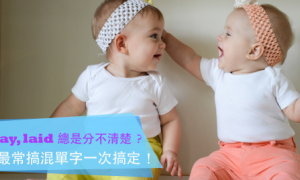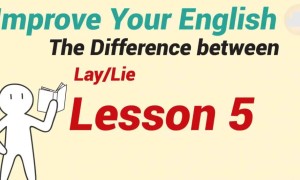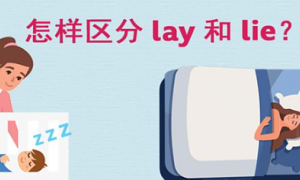lie, lie in
lie的原意是“躺”,常可以引申为“在”“处在”;lie in用于抽象的情况下,常译为“在于”。试比较:
The harbour lies to the east of the city.
港口在城市东面。
The cure lies in education.
挽救之道在于教育。
lie, be situated, nestle, stand
这组词(组)都可表示地理位置中的“位于”,它们的区别在于:
1.lie用于海、湖、都市、道路等平坦宽阔的地方。
2.be situated侧重地理位置或环境。例如:
The village is situated in a valley.村庄坐落在山谷中。
3.stand常用于建筑物,多想象为主体的体积。例如:
The house stands by the wayside.房子坐落在路边。
4.nestle的意思是“半隐半现地坐落在…之中”。例如:
The country house nestles among the pine trees.这个别墅半隐半现地位于松林之中。
lie, lay
lie的过去式与lay的现在式同形,故极易混淆,其实这两个词区别很大。lay是及物动词,意为“把…置于”,而lie是不及物动词,意为“躺着,平放,位于”。前者表动作,后者表状态。试比较以下两个句子:
He laid his dictionary on the shelf.
他把词典放在书架上。
The dictionary is lying on the shelf.
那本词典放在书架上。
下面两句话强调的重点不同。试比较:
He often reads books lying.(强调阅读)
He often lies reading books.(强调躺着)
他时常躺着看书。
lie in, lie to和lie on三者所表示的位置关系不同。试比较:
New York lies in the east of America.
纽约位于美国东部。(包含关系)
Japan lies to the east of China.
日本位于中国以东。(不包含关系)
America lies on the east of the Pacific.
美国位于太平洋东岸。(相邻关系)
下面两个句子的意思不同:
The old lady lay on the floor.
那老妇人躺在地板上(状态)。
The old lady lay down on the floor.
那老妇人躺到地板上(动作)。
lie, equivocate, fib, palter, prevaricate
这组词都可表示“说谎”。它们之间的区别是:
1.lie指直截了当地、不折不扣地说谎。
2.prevaricate常用作代替lie的正式用语,指用支吾、搪塞、推诿等手段来回避讲真话。例如:
She has got a pneumonia, but she prevaricates to him that she only gets a flu.她得了肺炎,但她告诉他只是得了流感。
3.equivocate指含糊其词或说话躲闪,强调搪塞。例如:
Answer yes or no, but don't equivocate.回答“是”还是“不是”,别搪塞。
4.palter指在说话或处理问题时反复无常,暗示说模棱两可的话或空口许诺、敷衍、搪塞。例如:
He always paltered with the promise, but he may not keep it.他多次允诺,但从未实现他的诺言。
5.fib常指无关紧要地说谎。例如:
The child fibs when he thinks he can gain something by doing so.这个孩子认为,他说谎可以获得一些东西,于是就这样做了。
lie, falsehood, story
这组词共同的意思是“谎言”“撒谎”。
1.lie指有预谋地或故意地歪曲事实真相;而falsehood则指与事实不符的假话。从使用范围上讲, lie比falsehood的使用范围要广泛;就语气来说, lie的语气比falsehood强, falsehood是一种委婉语,无论是有意还是无意,确实是一些不实之词。例如:
It's all lies, don't believe him.全是谎话,别相信他。
He told a falsehood to keep from being punished.为了逃避惩罚,他说了谎话。
2.story指真实发生过的事件,也可以指书中编写或想象出来的故事,有较强的文学色彩。例如:
My children love to hear detective stories.我的孩子们喜欢听侦探故事。
He promised to tell the children a story as soon as they had got into bed.他答应孩子们一上床,就讲故事给他们听。
She wrote a story about space exploration.她写了一篇关于探索外层空间的故事。
situate,lie,stand
这些动词都含“位于”之意。
situate通常用过去分词作表语,指某城镇、乡村或某物等的地理位置与环境的关系,即在何处。
lie最常用词,指国家、城镇、道路、湖海等所处的位置。
stand多指建筑物等被拟人化之物立于某处。










